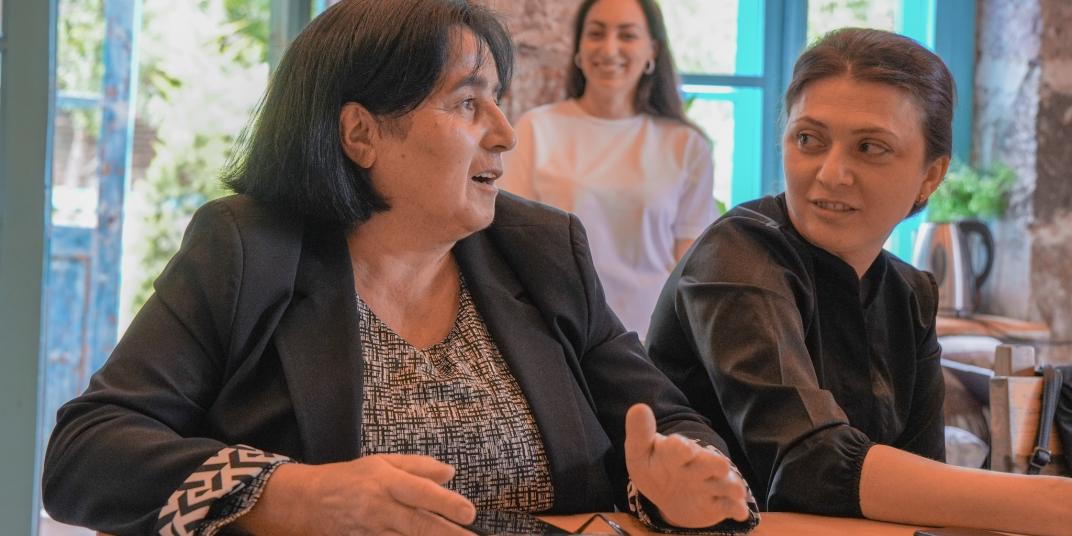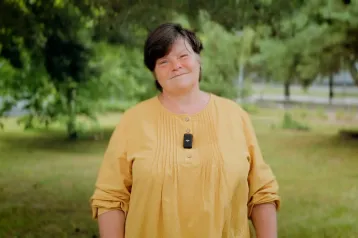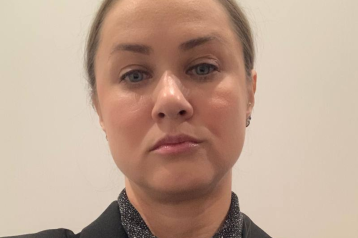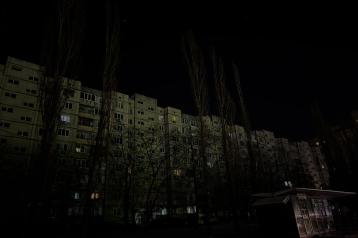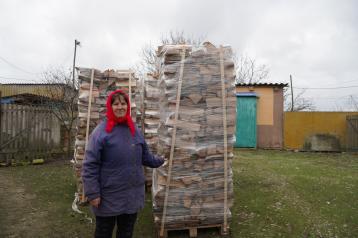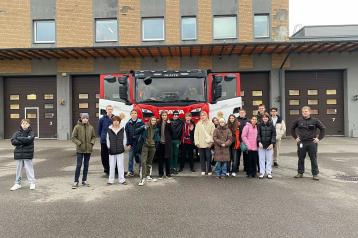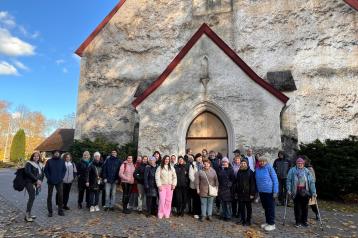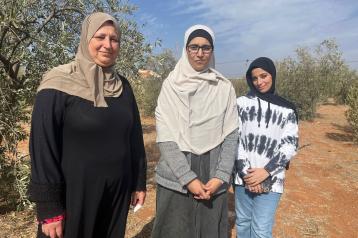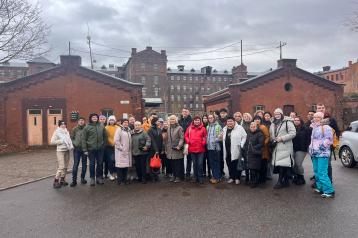Countries
- On 8 and 9 August, the Opinion Festival took place in Paide, where we, together with the Estonian Human Rights Centre and the Office of the Gender Equality and Equal Treatment Commissioner, organised a discussion on structural racism, and Estonian Refugee Council Director Eero Janson took part in a discussion on humanitarian funding.
- In cooperation with the Integration Foundation, we help foster mutual understanding, trust, and civic engagement among third-country nationals through a variety of events held across Estonia.
- In July, we organised a summer camp in Kloogaranna for 38 children of Ukrainian frontline workers to support their well-being and develop their social skills.
- In Ukraine, we have provided cash-based humanitarian assistance to nearly 309,000 people.
- In Armenia, new self-help groups have started their work, supporting mental health and independent living.
- In Georgia, we are about to launch training sessions to strengthen the capacity of local NGOs and civil society organisations to better respond to various challenges.
- In Jordan, agricultural training for 40 Syrian refugee and local community women has been completed. As a next step, 12 of these women will receive support to establish hydroponic greenhouses on their home plots.
Ukraine
We provide cash assistance, which allows people affected by the war to purchase food, medicines, hygiene products, and other essentials. As of now, we have provided cash-based assistance to nearly 309,000 conflict-affected people, worth more than 57 million euros. Cash assistance is provided for three months, with the support of 3600 Ukrainian hryvnias per household member per month, equivalent to about 80 euros. Registration for assistance is carried out through Estonian Refugee Council's local registration points or via the online application platform. Currently, our focus is on assisting those in need in frontline areas in Zaporizhzhia, Donetsk, Luhansk, Kharkiv, and Kherson oblasts. The programme is funded by the European Union, the USAID's Bureau for Humanitarian Assistance (BHA), and the Estonian Ministry of Foreign Affairs. Acted is the lead partner for EU and BHA projects.
The people from war torn areas of Poltava, Kirovohrad, Cherkasy, Dnipro, and Kharkiv oblasts can submit applications on our platform to get support for business ideas and existing micro businesses. The self-employment programme allows people to take part in online business trainings, get mentoring support and receive business micro grants. The project is developed in partnership with WEBPROMO and funded by the Bureau for Humanitarian Assistance (BHA).
We continue to provide emergency livelihoods support to most vulnerable conflict affected households. Our emergency livelihoods support helps people strengthen their self-reliance through agriculture, livestock, food production, and small services. The average grant is around 700 euros. In July we held six information sessions in Poltavska, Kirovohradska and Cherkaska oblasts, and placed submission boxes in these locations to give equal access to people without internet or computer skills. The program is funded by the European Union, BHA, and the Estonian Ministry of Foreign Affairs.
We provide psychosocial support via a mental health hotline for Ukrainians living both in Ukraine and abroad to support the people affected by the war. The work of the NPA Psychological Hotline is implemented in partnership with the National Psychological Association of Ukraine and made possible thanks to funding from ESTDEV – Estonian Centre for International Development.
Estonia
At this year’s Arvamusfestival (Opinion Festival), we organised a discussion on racism titled I’m not a racist, but… – real stories from Estonia, in cooperation with the Office of the Gender Equality and Equal Treatment Commissioner and the Estonian Human Rights Centre. The aim of the discussion was to bring this underrepresented topic into the public spotlight, build a shared understanding of the problem, and encourage people to look for solutions so that everyone would feel welcome in Estonia. In addition, the director of the Estonian Refugee Council, Eero Janson, took part in a foreign policy discussion titled More Crises, Less Money. The discussion explored how the growing gap between intensifying global crises and declining funding affects both target countries and Europe.
With the support of the European Social Fund+ social innovation initiative, we are implementing the project Language Ladder to support Ukrainian refugee youth in language learning and social integration. Read more on the website of the Estonian Refugee Council. The project is being implemented in collaboration with Tallinn University and the Polish organisation Dobra Fabryka. Funded by the European Union. Views and opinions expressed are however those of the author(s) only and do not necessarily reflect those of the European Union or European Social Fund Agency. Neither the European Union nor the Granting Authority can be held responsible for them.
We conduct monthly adaptation support training sessions on various subjects, including use of e-services, parenting, education system, adaptation of pensioners, legal matters, entrepreneurship, medical and social system, labour market, as well as legal foundations and residence permits. The training sessions take place across Estonia, both in face-to-face and online formats. In July, 154 people took part in training sessions. Since 2022, a total of nearly 11,550 people have participated. There continues to be strong interest in learning about the various legal grounds for building a life in Estonia.
We provide counselling by appointment at the Estonian Refugee Council office (Vambola 6, Tallinn) every day from 10 am to 5 pm. Our information hotline is open to all refugees, as well as institutions and individuals assisting them, at +372 5881 1311 (Monday to Friday from 10 am to 5 pm), and via email at counselling@pagulasabi.ee. Additionally, counselling services are available on Viber, WhatsApp, and Telegram at +372 5464 0007.
We organise regular group activities and community events across Estonia. In July, nearly 112 people took part in community activities across Estonia. Several community events were held to support language learning, youth engagement, and community integration. There were women’s language cafés, a film evening, and trips to the Viru bog, Äksi by Lake Saadjärv, and the family day at Sagadi Manor. Community activities are supported by UNHCR, the UN Refugee Agency.
We are running the MindSpring group based programme for people with refugee backgrounds to help them adjust to life in a new country. The programme is being implemented with the support of the Estonian Ecumenical Relief Organization (EERO Canada), funded by donations collected in Canada and the United States.
In cooperation with the Integration Foundation, we are launching training activities to strengthen the capacity of local governments in the fields of migration and integration. The project is implemented with the support of the Asylum, Migration and Integration Fund (AMIF), co-funded under project no. AMIF.1.02.23-0006 “Enhancing the capacity of local authorities to support third-country nationals, including beneficiaries of international protection, and to address migration-related challenges (information provision and support for the delivery of public services)”.
In cooperation with the Integration Foundation, we are launching joint activities across Estonia aimed at increasing the social engagement, trust and understanding of third-country nationals, including beneficiaries of international protection. Project no. AMIF.1.02.23-0005 “Cooperation activities to increase the civic engagement of third-country nationals, including beneficiaries of international protection” is co-funded by the Asylum, Migration and Integration Fund (AMIF).
In July, we organised a summer camp for 38 children of Ukrainian frontline workers. The camp focused on enhancing young people’s overall well-being and social skills through time spent in nature, teamwork, and creative activities.The camp was funded and co-organised by the Tallinn City Government.
Armenia
In Armenia, we are establishing hydroponic greenhouses at three schools in the Tavush region and supporting the adoption of water- and energy-efficient agricultural solutions. We help the schools cope with the impacts of climate change and ensure food security in water-scarce conditions. The programme also supports environmental education for children and increases student engagement with agricultural and environmental topics. Our partner is the Estonian University of Life Sciences to apply Estonia’s expertise in setting up and managing hydroponic greenhouses, composting systems, and energy-efficient agricultural practices. In July, we installed greenhouse frames and prepared teaching materials to train people in composting and greenhouse plant cultivation. The programme is funded by the Ministry of Climate of the Republic of Estonia.
Thanks to funding from the European Union, we are launching four community councils in Armenia to enable people with refugee backgrounds to voice their concerns, advocate for solutions to their problems, and take part in decision-making processes that affect them. Community councils in Yerevan, Dilijan, Gyumri, and Yeghegnadzor will begin work in August. Similar councils have been previously established in Estonia and Georgia. We are also running self-help groups that support the mental well-being of people with a refugee background and provide them with practical skills and support to start or restore small businesses and secure sustainable livelihoods. The self-help groups in Hrazdan and Dilijan met in July, and business training will start in August. In June, 13 livelihood grants were awarded to participants who had completed self-help groups, and mentoring sessions have also begun. The programme is funded by the European Union.
Georgia
We continue strengthening local NGOs and civil society organisations in Georgia. The programme enhances their ability to address regulatory challenges, secure the funding needed for operations, and promote cooperation between different regions.
We support Ukrainian refugees in Georgia through cash-based humanitarian assistance. Each eligible household will receive one-off support of 265 GEL (approximately 93 euros) per person, for up to three family members. We are now taking applications on the Estonian Refugee Council’s platform.
Jordan
In Jordan, we support the self-sufficiency of vulnerable female-headed households through smart and climate-friendly agricultural practices. The project also extends to four female-led community organisations, providing them with hydroponics training to promote water-efficient agricultural methods across the region.
40 women from Syrian refugee and local communities have now completed the agricultural training course. The programme equipped participants with essential hydroponics agricultural knowledge, enhanced water-conservative farming skills, and encouraged them to pursue independent livelihoods. We are now receiving applications for a startup grant, giving 12 women a practical follow-up opportunity in the form of fully constructed hydroponic greenhouses, enabling them to secure food for their families and generate income through produce sales. The activities of the Estonian Refugee Council in Jordan are supported by ESTDEV – Estonian Centre for International Development.
Syria
The Estonian Refugee Council is opening an office in Syria to support people affected by the civil war and help them rebuild their lives. The Refugee Council has been involved in regional support for Syria since 2018 and has also supported the long-term self-reliance of Syrian refugees in Jordan and Lebanon.
